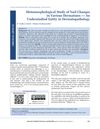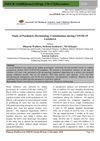 May 2023 in “Sučasna pedìatrìâ. Ukraïna”
May 2023 in “Sučasna pedìatrìâ. Ukraïna” An 11-year-old child with total hair loss may have a genetic autoimmune disease, and the outlook for hair regrowth is not good.
 May 2023 in “Dermatology and therapy”
May 2023 in “Dermatology and therapy” The document concludes that identifying the cause of eyebrow and eyelash loss is key to treating it and improving quality of life.
 May 2023 in “Pharma innovation”
May 2023 in “Pharma innovation” Ringworm in cattle can be effectively treated with Povidone iodine and Whitefield ointment.
 March 2023 in “Journal of the turkish academy of dermatology”
March 2023 in “Journal of the turkish academy of dermatology” High levels of ceruloplasmin might indicate more severe toenail fungus.
 January 2023 in “Journal of men's health”
January 2023 in “Journal of men's health” Higher dihydrotestosterone may be linked to more inflammation in COVID-19 patients with low testosterone.
 December 2022 in “Journal of medical sciences and health”
December 2022 in “Journal of medical sciences and health” Examining nail biopsies is useful for diagnosing nail diseases.
 December 2022 in “International Journal of Biomedicine”
December 2022 in “International Journal of Biomedicine” Androgens may worsen COVID-19 and hair loss could indicate the disease's severity.
 November 2022 in “Journal of the Endocrine Society”
November 2022 in “Journal of the Endocrine Society” A woman with ectopic Cushing's syndrome and COVID-19 passed away despite treatment.
 August 2022 in “Nature Biotechnology”
August 2022 in “Nature Biotechnology” Drug approvals slowed in 2Q22, but notable drugs like Amvuttra, Camzyos, and Olumiant were approved.
 July 2022 in “Research Square (Research Square)”
July 2022 in “Research Square (Research Square)” Lower PPARγ levels and specific gene variations are linked to more severe Frontal Fibrosing Alopecia.
 May 2022 in “International Journal for Research in Applied Science and Engineering Technology”
May 2022 in “International Journal for Research in Applied Science and Engineering Technology” Iron supplements combined with Quilib lotion effectively treat hair loss in people with iron deficiency anemia.
 May 2022 in “Acta Scientific Women's Health”
May 2022 in “Acta Scientific Women's Health” A woman lost over 80% of her hair due to a condition called telogen effluvium after having COVID-19.
 March 2022 in “Journal of Parasite Science”
March 2022 in “Journal of Parasite Science” Scabies affects 9.29% of rabbits in Kuala Lumpur, mostly with mild symptoms.
 December 2021 in “Biomedical journal of scientific & technical research”
December 2021 in “Biomedical journal of scientific & technical research” Oral processed egg yolk improves hair regrowth and quality in alopecia patients.
 June 2021 in “World Journal Of Advanced Research and Reviews”
June 2021 in “World Journal Of Advanced Research and Reviews” A stable emulsion made with plant extracts and oils was effective in stimulating hair growth.

A man with four autoimmune diseases suggests a new category for multiple autoimmune syndrome.
 January 2021 in “ACTA SCIENTIAE VETERINARIAE”
January 2021 in “ACTA SCIENTIAE VETERINARIAE” A dog with skin issues improved with prednisone after accurate diagnosis.
 December 2020 in “Nigerian journal of animal production”
December 2020 in “Nigerian journal of animal production” Dexamethasone can cause diabetes in rats, and Annona muricata bark extract may help lower blood sugar.
 December 2020 in “Journal of medical science and clinical research”
December 2020 in “Journal of medical science and clinical research” Most child skin problems during the COVID-19 lockdown were not emergencies and could have been handled by teleconsultation.
 October 2020 in “International journal of Ayurvedic medicine”
October 2020 in “International journal of Ayurvedic medicine” Leech therapy and Ayurvedic treatment can effectively regrow hair in recent Alopecia areata cases.
 June 2020 in “Journal of Dermatological Treatment”
June 2020 in “Journal of Dermatological Treatment” Use telemedicine and strict hygiene for safe hair and scalp treatments during COVID-19.
 March 2020 in “International journal of contemporary medical research”
March 2020 in “International journal of contemporary medical research” Patients with metabolic syndrome often have skin problems like acanthosis nigricans and skin tags, and early treatment is important to prevent serious issues.
 March 2020 in “Poster presentations”
March 2020 in “Poster presentations” Accurate diagnosis of SLE requires extensive testing due to its complex symptoms.
 February 2020 in “International Journal of Research in Dermatology”
February 2020 in “International Journal of Research in Dermatology” EPDS is a rare, chronic scalp condition that's hard to treat and needs better awareness for improved outcomes.
 November 2019 in “Journal of Aesthetic Nursing”
November 2019 in “Journal of Aesthetic Nursing” The article concludes that a thorough diagnosis and treatment plan, including medications, non-invasive methods, or surgery, is important for managing hair loss, with a combination of minoxidil and finasteride being particularly effective.
 September 2019 in “Journal of Investigative Dermatology”
September 2019 in “Journal of Investigative Dermatology” Retinol significantly reduces neck wrinkles.
 September 2019 in “Journal of Investigative Dermatology”
September 2019 in “Journal of Investigative Dermatology” Sandalore, a synthetic scent, was found to reduce hair loss and improve hair growth in women with hair shedding issues.
 September 2019 in “Journal of Investigative Dermatology”
September 2019 in “Journal of Investigative Dermatology” Sandalore®, a synthetic scent, reduced hair loss and improved hair growth in women with telogen effluvium.
 September 2019 in “Journal of Investigative Dermatology”
September 2019 in “Journal of Investigative Dermatology” Sandalore® reduces hair shedding and increases hair volume in women with telogen effluvium.
 April 2019 in “The journal of investigative dermatology/Journal of investigative dermatology”
April 2019 in “The journal of investigative dermatology/Journal of investigative dermatology” 848 genes related to fat and metabolism are less active in people with Central Centrifugal Cicatricial Alopecia.






























